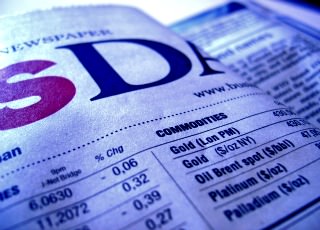Commodities are traded with futures contracts
Commodities are basic products that are all the same. For instance, a barrel of oil will seldom vary from other barrels of oil, but products such as clothing will vary greatly, so it doesn't meet the definition of a commodity. To make trading easier, rather than bringing the products to market, they are sold via a futures contract, meaning both payment and delivery are in the future.
 The commodity must meet a minimum quality and contracts are standardized for a specific quantity. The contract may be for 5000 bushels of No. 2 soybeans. The price increments and date are set. For instance, price increments might be ¼ cent per bushel, which in this case would be increments of $12.50
The commodity must meet a minimum quality and contracts are standardized for a specific quantity. The contract may be for 5000 bushels of No. 2 soybeans. The price increments and date are set. For instance, price increments might be ¼ cent per bushel, which in this case would be increments of $12.50
Trading commodities – risk and safety by using specific tactics
Commodities are traded by some people, such as farmers to ensure a profit on their crops. They may sell contracts earlier in the year. If he believes he'll have a bumper crop later that year, just as others will, which will lower the price, he sells a contract a few months earlier for the best price just in case it falls. He uses the contracts to offset the loss when he sells his soybeans and makes the profit he requires to keep his farm in the black.
Hedging with options
Other people hedge this way by investing in two contracts that provide a negative correlation. It's a form of insurance to protect themselves from a negative turn of events. Investors use derivatives called options to hedge their bets. The options give them the option to buy or sell at a specific price before a specified expiration date.
The purchaser of an option has the right but not the requirement to buy or sell a contract at the price stated, but the seller of the option has the obligation to buy or sell if the purchaser demands it. If you bought an option expecting the price of a commodity to go up and it did, you'd buy the contract if it didn't you'd let the option expire. If you sold the contract, you'd have to sell if the price went up and you'd lose money. If you own a contract and sold the option, the price you received on the option would help offset any loss or increase your profit.
The risky side of trading
Whether you're trading commodities contracts or options, there are huge risks. Selling naked, meaning selling an option to buy a specific contract without owning that contract, is extremely risky. If you sell the option to sell, expecting the price to drop, but it skyrockets, you are obligated to sell at that price and have to buy a higher cost contract to fill the order. If the price drops, the purchaser of the option won't purchase the contract and you made money on it.
If on the other hand you sell a contract that states you'll buy a specific commodity at a specific price and the price rises, the purchaser of the option won't want to exercise his or her option and you've made money on the contract. You may be stuck purchasing a contract that's far higher than the market price and end up losing the difference between the rise in price and market price, less the money you made on the option.
While there are losses in options on futures, the biggest reason people often trade in options, rather than actual commodities contracts, is because they cost only a fraction of the price of the contracts and you can make high profits and if you trade conservatively, only risk your initial investment.
Related articles
Trading signal service for you!
Understanding the commodity market
Research and analysis tools